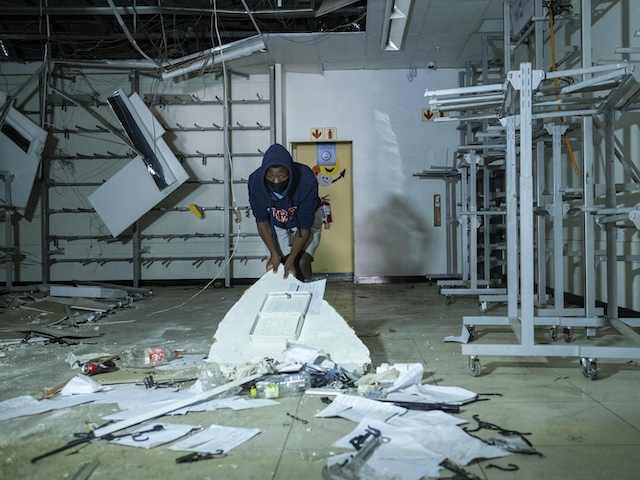FoodForward SA (FFSA), a food supply organization that works to end hunger in South Africa, announced on Thursday it would shut down its operations in five major cities after looters cleaned out their warehouse in Durban.
The shutdown will impact the food supply of roughly 675,000 people who depend on the group for food.
The Durban warehouse supplied the KwaZulu-Natal and Free State provinces, the former area being the home of former South African President Jacob Zuma, currently in prison for contempt of court and facing corruption charges pertaining to his time in office. KwaZulu-Natal and the nation as a whole have experienced mass rioting, looting, and violence in the past several days, reportedly by Zuma’s supporters. Durban, in particular, has been a chaotic hot spot. The city now faces massive food shortages after a wave of rioting decimated the supply of edible goods.
FFSA partners with 1,250 beneficiary groups to distribute food to the impoverished populace of South Africa. In 2020-2021, the group distributed over seven tons of food and 29 million meals, according to the organization’s website. Of the group’s approximately 675,000 individual beneficiaries, at least 125,000 “vulnerable” people are dependent on the Durban warehouse’s supply for food, FFSA development manager Deidre Adams told Cape Town’s Groundup.
The group expects to face significant financial setbacks from the looting of their warehouse. Adams noted the rioters took all of the food stored there and, while the total value of lost goods remains unknown, “we know it’s going to be millions because they took everything.”
“They also vandalised our vehicles and managed to steal one of our eight-ton refrigerated trucks,” she added. “A truck like that costs over a million. These are speciality trucks because they are refrigerated. The infrastructure is also expensive because we need to maintain the cold temperatures since we distribute fresh produce as well.”
Further worsening the food supply situation for the country is FFSA’s decision to temporarily shutter its other branches nationwide. The organization maintains warehouses in Cape Town, Gqeberha, Durban, Johannesburg, and Rustenburg, which collectively supply all nine of South Africa’s provinces.
“We decided to also close all of our branches, not only the Durban branch, for the rest of the week because of safety issues,” Adams continued. “So there is now going to be heightened food insecurity amongst all the 675,000 people.”
Zuma became South Africa’s president in 2009, the first Zulu, the nation’s largest ethnic group, to serve in the role. Prior to his election, the executive branch was firmly under the domination of the Xhosa, and had been so since the end of Apartheid in 1994. The nation’s Constitutional Court sentenced him to 15 months in prison for contempt of court after he refused a court order to cooperate with an inquiry investigating his alleged corruption while president from 2009-2018. He has not been convicted of any corruption charges.
Prior to his July 8 entry into police custody, Zuma slammed the sentence as a return to “Apartheid rule” and asserted any prison time would be “sentencing me to death,” given his age and the ongoing coronavirus pandemic. He has further made repeated efforts to oust his prosecutor, Deputy Chief Justice Raymond Zondo, accusing him of acting “unfairly and with bias.” While his legal ploys failed to produce fruit in a court of law, Zuma turned to the court of public opinion for aid, staging protest marches against Zondo and his investigation.
The rioting and chaos, ostensibly in support of Zuma, has provoked a military response from the South African government and forced individual citizens to take up arms to defend their vulnerable property. The military has deployed 25,000 troops to curtail the rioting while vigilante groups have further organized to protect public and commercial infrastructure from violent actors. At least ten people had died on Tuesday, sending the death toll soaring to at least 72, per the Associated Press. There have been over 1,200 arrests.
Duduzane Zuma, son of the imprisoned Jacob, made a desperate plea to his father’s nominal supporters on Wednesday, begging them to behave “responsibly” in a video message on a friend’s Instagram. Though he condemned the acts of violence and claimed to understand those who used force to defend their property, the younger Zuma nevertheless blamed the chaos on a slew of domestic problems, including his father’s imprisonment, poverty, unemployment, ethnic tensions, and the Chinese coronavirus lockdowns. His plea seems to have largely fallen on deaf ears.

COMMENTS
Please let us know if you're having issues with commenting.